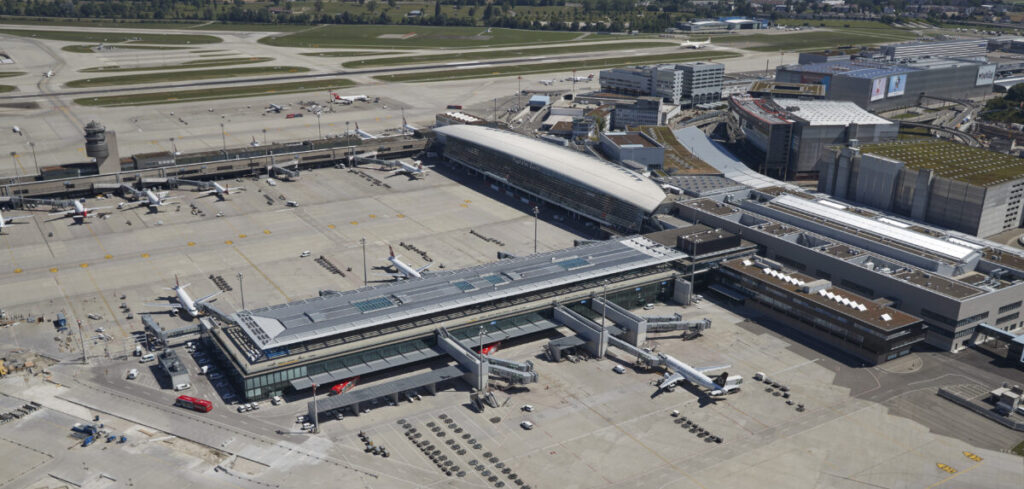Emanuel Fleuti, head of environment at Zurich Airport, discusses the results of a study into the effects of reduced air traffic on the local air quality at the airport and the contribution of air traffic to the overall ambient air quality situation.

Can you tell us about some of the key findings from the study you carried out looking at the effects of air traffic on local air quality? Did air quality improve during Covid-19 lockdowns?
The results of the study revealed several key findings. One key observation was the non-linearity between the emissions and concentrations. While NOx emissions dropped by an overall of 83%, the related NO2 concentrations only decreased by 44% at the airport and by only 30%-35% at two monitoring stations outside, but close by, the airport.
A second observation was the influence of the adjacent road traffic emission on the on-site concentrations. While road traffic also decreased (approximately 40% versus an aircraft decrease of 90%), the typical morning and evening peak in concentrations from the road traffic could still be found at the airport monitoring location. And finally, fine dust concentrations showed to be highly variable depending on the wind situation and proved to be influenced by ambient large scale meteorological conditions rather than local aviation activity. In summary, the significant improvement in the air quality could be observed, triggered in large by the drop in road traffic, but also by the reduction in aircraft activity.
Who did you work with on this project and what was the ultimate aim?
The aim of the study was to better understand the airport’s and aviation’s contribution to the local air quality concentrations by taking the opportunity during the lockdown and 90% drop in aircraft traffic. Zurich Airport conducted the study voluntarily and with its own expertise. Road traffic data was obtained from the cantonal administration and air quality monitoring results also from nearby cantonal monitoring stations.
How was the study carried out?
The approach has been structured to first define the questions and the data need. Then the data was obtained, either through the airport’s internal system (air traffic data, air quality monitoring results, meteorological data) or through the cantonal administration for both the same time period in 2019 and 2020 [April 1-7]. In the next step, a proper emission model was set up and the emissions by source group modeled. This was important, as road traffic also reduced its emissions and thus had an impact on the concentrations. Eventually, we had emissions, concentrations, wind data by location and source group for a pre- and during-pandemic situation. The following analysis included looking at the data during various weather conditions, as wind effects are usually much larger than just emission effects.
Has the study resulted in any new measures or solutions/technologies being adopted at Zurich?
The study results were not intended or suitable to adopt new measures at this point.
What was the significance of meteorological anomalies?
When looking at the fine dust concentrations, they showed a far lower reduction than for instance NO2. So initially the question was how this had a link to the aircraft emissions. Further, wind-dependent analysis and cross-checks across Switzerland revealed that there was an extra emission source of dust which originated in the Sahara (so called Sahara-dust). This indicated once more that a correlation is not necessarily a causality.
Do you think the global pandemic will result in airports accelerating decarbonization plans, as lockdowns have highlighted the impact air traffic has on the environment?
Airports, like all industries, distinguish between local air quality concentrations and greenhouse gases that affect the climate. The global pandemic may have an impact on local air quality but no real impact on the climate crisis. As such, decarbonization remains high on the agenda of airports. However, given the current economic restrictions, any acceleration will be extremely difficult for airports to absorb. I assume this similarly applies to airlines.
What are the main ways airports can improve air quality both inside and outside of the terminal?
The focus should be on the prevention and then reduction of emissions that contain air contaminants. Such measures can be technological, operational, regulatory or economical.
How has Zurich Airport improved air quality at the airport? Have any new investments been made in this area?
Zurich Airport has already adopted a range of measures across all source groups to reduce local air pollution. These include emission-based landing charges, an APU (auxiliary power unit) regime with stationary ground power and operating restrictions, advanced GSE (ground support equipment) improvements and public transportation. Investments include building renovations, installation of new solar PV plants and electrical vehicles. In 2020 another seven PV plants went on the airport grid, adding 25% to the existing capacity.
Looking specifically at the terminal, how has Zurich improved the air inside buildings? Have the HVAC systems been updated?
Zurich Airport has monitored outdoor and also indoor air quality. A key measure to improved indoor air quality is regular maintenance of the filter systems. We use ionization and active coal and glass-fiber bag systems to provide good indoor air quality. A study in 2019 showed that the existing glass-fiber bags remove more than 90% of the ultrafine particles in the ambient air.
What other ways can airports improve air quality inside the airport?
Improvement of indoor air quality begins in the proper planning of the HVAC systems: where to place the air intake, filter systems, circulation performance and finally the exhaust. Proper utilization and then maintenance are key to the provision of a good indoor air quality.
Is biophilic design important?
The connectivity between people and natural environments provides a valuable asset in terminals. Plants are not only natural and efficient filter systems for several air pollutants; they also contribute to the overall quality of the passenger experience. Many airports have already adopted biophilic design and implementation.
Do you think more airports will provide access to outside spaces while passengers are waiting for their flights?
Airports are continuously exploring ways to enhance passenger experience. The access to outdoor recreational areas is one of several elements. The questions primarily arising are whether such outdoor spaces are within the security-controlled area, whether the spaces are really outdoor (or just provide the feeling as if) and, of course, whether any such space actually provides a ‘healthy’ spot. If they can be answered positively, airports will certainly evaluate cost-benefits for that.
Do you think more still needs to be done by the airport sector to improve air quality at airports?
My experience has shown that while many airports do a lot of good things, there is always some room for improvements. When looking at the large emission sources at airports, there are areas where the airports can exercise some influence. This mainly covers aircraft operations (taxiing) and aircraft handling operations (APU, GSE). Addressing those emissions and taking measures will lead to an improvement in air quality at airports.
Is there anything else you would like to add?
What’s important is that airports adopt a systematic approach with their stakeholders and claim the responsibility where they have it. And finally, all studies and surveys are fine, but in the end, only action counts.
Read more about how airports are improving their air quality in the June 2021 issue of Passenger Terminal World.
View the Zurich Airport report here: https://report.flughafen-zuerich.ch/2020/ar/en/air-quality/

